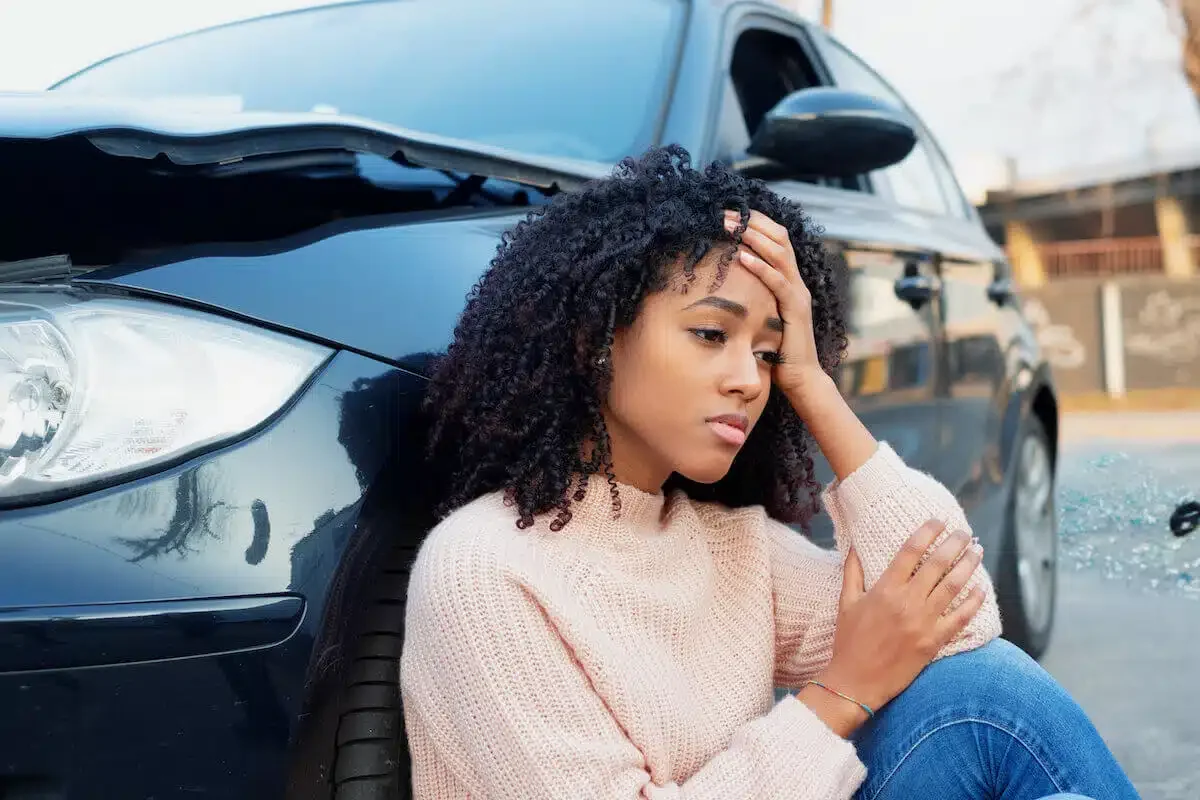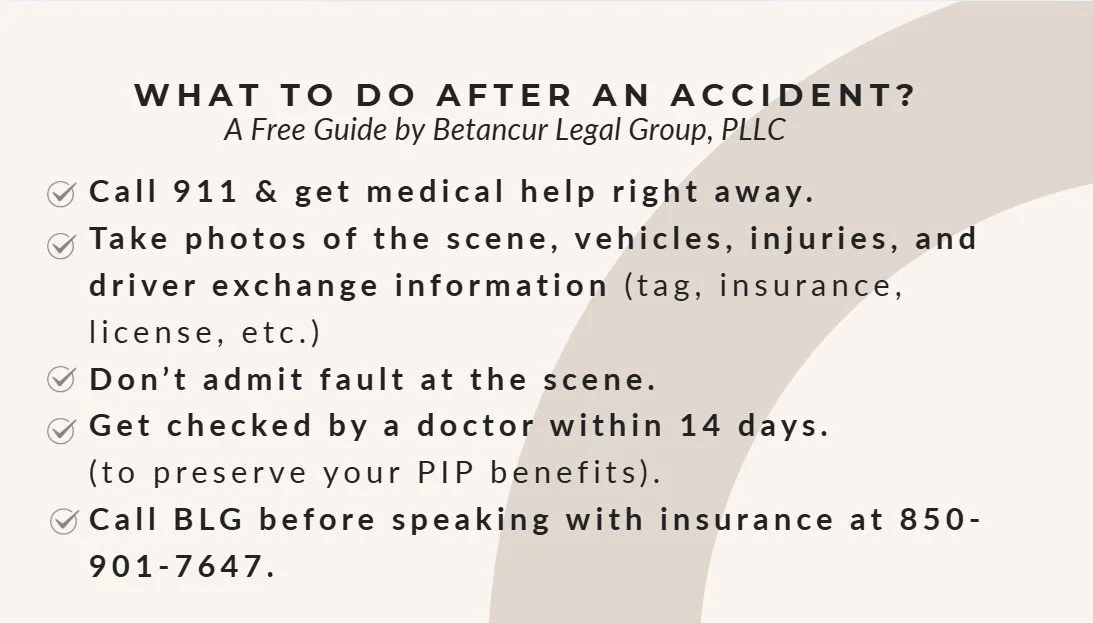Tallahassee Car Accident Checklist: 7 Steps to Protect Your Rights
Read Time: 5 minutes
A car accident can be terrifying, confusing, and overwhelming—especially when injuries, property damage, and insurance companies are involved. If you ever find yourself in a collision in Tallahassee or Leon County, having a clear, step-by-step “checklist” can help you protect your health, your legal rights, and your future. Below is a 7-step Tallahassee car accident checklist to follow immediately after a crash, plus a helpful FAQ and next steps
Step 1 – Check for Injuries & Call 911
Your first priority is safety and health. After an accident, immediately:
Check yourself and passengers for injuries.
If anyone is seriously hurt (bleeding heavily, unconscious, head/neck trauma, etc.), do not move them (unless there’s immediate danger like fire).
Call 911 (Tallahassee police + EMS) for medical assistance and to report the crash.
Having a police and medical record from the moment of the crash is vital later for claims and evidence.
Step 2 – Move to Safety & Document the Scene
Once law enforcement and EMS are dispatched:
If possible and safe, move your vehicle out of traffic (turn on hazard lights).
Take photos or video from various angles: vehicle damage, skid marks, road conditions, debris, traffic signs, lighting, surroundings.
Capture close-ups of damage and wide shots showing the full scene.
Photograph any visible injuries (bruising, cuts, swelling).
Note the time, date, location (street names, nearest crossroad), weather, and lighting conditions.
A well-documented scene strengthens your case and helps lawyers or insurers understand exactly what happened.
Step 3 – Exchange Information (Drivers & Witnesses)
Florida law demands timely exchange of certain information:
Exchange names, addresses, phone numbers, driver’s license numbers, license plate numbers, vehicle make/model, insurance company names, and policy numbers.
Ask for contact info from witnesses (name, phone, email) and record their statements or observations.
If someone refuses or flees, try to capture identifying details (vehicle make, color, direction, partial plate).
Witness testimony is often crucial when insurance companies dispute fault.
Step 4 – Report to Law Enforcement (Florida crash report rules)
You might wonder: “Do I always have to call the police for a minor accident in Florida?” The answer is not always, but in many cases yes:
Under Florida Statute § 316.065, you must immediately notify law enforcement if anyone is injured or killed or property damage exceeds $500.
If a law enforcement officer comes to the scene, they will file a long-form crash report. Under Florida Statute § 316.066, that officer must submit the long form within 10 days of finishing the investigation.
If your crash doesn’t meet those thresholds, an officer may provide a short form or an “exchange of information” form instead.
If no police respond, you may need to file a self-report with your local law enforcement or the Florida Department of Highway Safety & Motor Vehicles (FLHSMV).
Step 5 – Seek Medical Attention (Florida’s 14-day PIP rule)
Even if you feel “fine” right after the crash, hidden or delayed injuries (soft tissue, whiplash, internal) often manifest later. Crucially, Florida law imposes a 14-day rule linked to Personal Injury Protection (PIP) benefits:
Under Florida Statute § 627.736, to be eligible for PIP benefits, an injured party must seek medical treatment within 14 days of the accident. If you delay past 14 days, your insurer may deny or limit your PIP claim.
Some law firms and legal resources caution that missing this deadline may disqualify you from PIP coverage entirely.
Even if your symptoms seem minor, see a qualified medical provider immediately and follow their recommendations.
Getting prompt medical care not only protects your health but also supports your legal claim by establishing a clear connection between the accident and your injuries.
Step 6 – Contact Your Insurance
Once you are safe, begin the insurance process:
Notify your insurance company as soon as possible (many require “prompt” notification).
Provide the basic facts but avoid admitting fault. Let your insurer know you’re documenting everything and possibly seeking legal counsel.
Submit your medical bills, repair estimates, and any documentation you gathered (photos, police report).
Cooperate with your insurance adjuster but always consult your attorney before signing statements or settlements.
Under Florida’s no-fault system, your insurer’s PIP coverage is typically your first channel for medical expense reimbursement, regardless of fault.
Step 7 – Call a Tallahassee Car Accident Lawyer
Even a seemingly simple accident can become complicated once insurance companies get involved. A local Tallahassee car accident lawyer can help you:
Determine fault and liability
Calculate your full damages (medical bills, lost wages, pain and suffering, and more)
Handle insurance adjusters and negotiations
File a lawsuit if necessary—within Florida’s statute of limitations
At Betancur Legal Group, our legal team helps accident victims across Tallahassee and Leon County navigate the process from start to finish. We’ll protect your rights, handle the paperwork, and fight for the maximum compensation you deserve—so you can focus on recovery.
Most importantly, you don’t pay unless we win. Contact us today for a free consultation and personalized case review.
Tallahassee Car Accident Checklist
FAQ: Do I Need to Call the Police for a Minor Accident in Florida?
It depends on the circumstances.
According to Florida Statute § 316.065, you must report a crash immediately if:
Anyone is injured or killed, or
Property damage appears to exceed $500
If those conditions don’t apply, a police response isn’t legally required—but it’s still strongly recommended. Having a police report helps protect you if the other driver changes their story, denies fault, or fails to cooperate with insurance later.
You can also submit a self-report to FLHSMV if officers do not respond. It’s a simple step that can make a big difference later.
Contact Betancur Legal Group Today
If you’ve been involved in a car accident in Tallahassee or Leon County, don’t wait to get the legal help you deserve.
The team at Betancur Legal Group is here to help you every step of the way—from filing reports and dealing with insurance companies to pursuing full compensation for your injuries.
We know how stressful a crash can be, and we’re ready to fight for your recovery. Call us today for a free consultation and take the first step toward protecting your rights.

